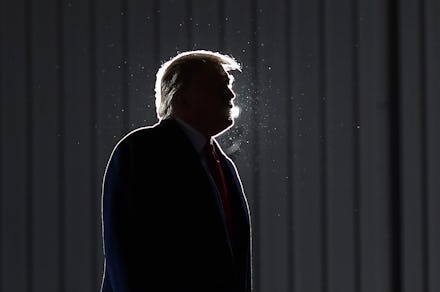Here's how Trump might disregard election results and remain in power

Donald Trump, master of subtlety that he is, has hardly kept quiet about his intent to dispute, disrupt, and altogether dismantle any election results that don't work to his favor this coming November. And with election day fast approaching, the president's already fascistic rhetoric has only increased in both tone and tenor. That Trump seems committed to laying the groundwork for a full-blown constitutional crisis (yes, another one) seems beyond dispute at this point. But what that could actually look like has remained something of a "let's cross that bridge, which will likely be on fire, and also covered in poisonous snakes, and probably about to explode, when we come to it" proposition.
Fortunately (or not) The Atlantic's Barton Gellman has actually taken the time to game out what a Trumpified contested election might actually entail, and believe me when I tell you that it is horrifying in both its implications and its plausibility.
The main threat — beyond the president almost certainly throwing a huge, diaper-filling tantrum if things don't go his way — is that Trump might use the mechanisms of government and his Jonestown-esque sway over the GOP to actively manipulate the chaos between election and inauguration day, ultimately granting himself a second term in the face of what Gellman described as a "legally unambiguous victory for Biden in the Electoral College and then in Congress."
Among the more terrifying scenarios Gellman laid out is one with which Trump has already flirted, albeit on a much more limited scale: What if election day chaos turns violent at polling stations, in part encouraged by the president himself?
We've already seen the president's supporters show a willingness to explicitly intimidate people hoping to cast their ballots during early voting, and it seems likely we'll see much more in the days and weeks to come. So imagine, then, that the president might once again choose to dispatch federal agents — and possibly even the military — to keep his definition of "the peace." This would, among other chilling implications, dramatically disrupt the normal flow of voters head into their polling locations. It's voter suppression, authoritarian-style.
The ultimate goal, as it seems, isn't simply to prevent votes so much as it is to throw the entire process into a quantum state of uncertainty. The more ambiguity and chaos surrounding the election, the easier it is for the president to simply declare the election officially over, as he suggested on Twitter earlier this summer.
Add to this Trump's ongoing attacks on mail-in voting, allegations of voter fraud, repeated claims of a "rigged election" and you can see how he is carving ample room to exploit a chaotic post-election vacuum of his own making.
Of course, there would be plenty of subsequent legal proceedings. Unfortunately, if the President's various means of saber-rattling are successful, those proceedings would be suitably tainted in the court of public opinion. The courts may have a legal interpretation of how best to proceed with the election ambiguity, but for much of the public — particularly the 30 or so percent of Americans who unwaveringly support the president — the decision will have already been made. Think of it sort of like Bush v. Gore, if that case had marinated in four years of political acrimony and fascistic maneuvering.
And that's just one possible avenue of disruption. There are other, potentially more alarming means by which Trump can use the power of the presidency to game the system to his favor. Consider this musing from Gellman:
According to sources in the Republican Party at the state and national levels, the Trump campaign is discussing contingency plans to bypass election results and appoint loyal electors in battleground states where Republicans hold the legislative majority. With a justification based on claims of rampant fraud, Trump would ask state legislators to set aside the popular vote and exercise their power to choose a slate of electors directly. The longer Trump succeeds in keeping the vote count in doubt, the more pressure legislators will feel to act before the safe-harbor deadline expires.
To be clear, the Trump campaign is, according to Gellman's reporting, actively considering using GOP political power to select enough members of the electoral college to simply vote in favor of the president (they're under no legal obligation to cast their ballot per the popular vote in their state, although we've grown to expect that they will) and simply use the Trump-created implication of voting irregularities as cover for what seems an awful lot like a multi-tier federal coup. After that, our Humpty Dumpty eggshell democracy, such as it ever was, will simply be too cracked and shattered for anyone to put together again.
If this all seems terrifying to you, well, it should. The president has made it abundantly clear that he has no compunction about using every lever of power given to him — both legally, and through the tacit approval of those meant to serve as a check against him — to keep his hands on those same levers for as long as he possibly can. While we don't know what will happen come November 3, it seems clear that what was once considered an unthinkable worst case scenario is now quickly coming into focus as a very real possibility. The only question then is: What will we do about it?